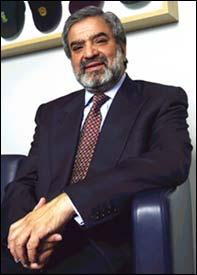Home > Cricket > Reuters > Report
Mani calls for international truce
Tony Lawrence |
June 20, 2003 15:59 IST
The new head of the International Cricket Council has called on its national board members to end their divisions for the good of the sport.
Ehsan Mani, who has replaced Australian Malcolm Gray as ICC president, said on Thursday: "We are dependent on each other. Without each other, cricket's spirit, its future and its traditions are compromised.
"It is time to forge a stronger alliance that will help take the game forward."
Mani, who formerly represented Pakistan on the ICC, was giving his first speech as president at Lord's following an annual conference.
 He said world cricket had to cope with various different cultures, traditions and identities split along Anglo-Saxon, Asian, African and Caribbean lines. Mani and ICC chief executive Malcolm Speed plan to visit each of the 10 full-member countries over the next few months.
He said world cricket had to cope with various different cultures, traditions and identities split along Anglo-Saxon, Asian, African and Caribbean lines. Mani and ICC chief executive Malcolm Speed plan to visit each of the 10 full-member countries over the next few months.
World cricket has been blighted by several controversies and conflicts recently, including the refusal of several teams to travel to Pakistan over security fears. Pakistan, concerned about lost revenues, at one stage threatened a tit-for-tat boycott by Asian countries.
Many of the power battles have split the game along racial and regional lines, although matches between India and Pakistan have been suspended because of tensions between their governments.
Speed, however, warned that there could be further conflicts ahead between the ICC and member countries following this year's World Cup.
The ICC faces compensation demands from broadcasters and sponsors after two Cup games were forfeited by England and New Zealand because of security concerns, while India's players refused to sign over their personal sponsorship and image rights to the official tournament sponsors.
Speed, also addressing the ICC forum, said the world body would contest the claims but, should it lose, it will pursue some of its members for part of the money.
Indian board president Jagmohan Dalmiya has made it clear that he will do everything he can to avoid paying any compensation, arguing that the ICC should foot the bill.
"It is always a difficult time for an organisation when it makes claims against it own members," Speed added.
PLAYER BEHAVIOUR
Speed also discussed the issue of player behaviour, saying it had not improved over the past year and that umpires would be given more time to charge players if they initially failed to spot offences.
Umpires currently have two hours after a day's play to lay charges but that will now have that extended to 18 hours, while the chief executive himself will be able to sanction players five days, rather than one, after an offence.
Speed also suggested there could be an argument for a third on-field umpire.
"Cricket is one of the most difficult games to umpire and there are only two of them on the field," he said, adding that there were seven in American and Australian football.
He said, however, that the umpires on the ICC's elite panel would have to continue to perform.
"If umpires do not perform they will not last on the panel," he said.
The forum was told by Mani that Bangladesh's overseas test programme would be cut back after the team's poor results, adding that Kenya would also face a major struggle to win test status despite their fine World Cup campaign.
The ICC has increased its membership to 89 nations, following the admission of Iran, Malawi, Mozambique, Rwanda, Saudi Arabia and Zambia.